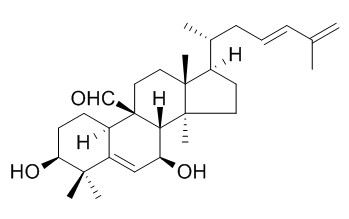Kuguacin J
Kuguacin J is a promising candidate new antineoplastic and chemopreventive agent for androgen-dependent prostate cancer and carcinogenesis, it exerts growth inhibition through G1 arrest and induction of apoptosis in androgen-dependent human prostate cancer. Kuguacin J modulates the function of P-glycoprotein (P-gp) by directly interacting at the drug-substrate-binding site, and it appears to be an effective inhibitor of P-gp activity in vitro and thus could be developed as an effective chemosensitizer to treat multidrug-resistant cancers.
Inquire / Order:
manager@chemfaces.com
Technical Inquiries:
service@chemfaces.com
Tel:
+86-27-84237783
Fax:
+86-27-84254680
Address:
1 Building, No. 83, CheCheng Rd., Wuhan Economic and Technological Development Zone, Wuhan, Hubei 430056, PRC
Providing storage is as stated on the product vial and the vial is kept tightly sealed, the product can be stored for up to
24 months(2-8C).
Wherever possible, you should prepare and use solutions on the same day. However, if you need to make up stock solutions in advance, we recommend that you store the solution as aliquots in tightly sealed vials at -20C. Generally, these will be useable for up to two weeks. Before use, and prior to opening the vial we recommend that you allow your product to equilibrate to room temperature for at least 1 hour.
Need more advice on solubility, usage and handling? Please email to: service@chemfaces.com
The packaging of the product may have turned upside down during transportation, resulting in the natural compounds adhering to the neck or cap of the vial. take the vial out of its packaging and gently shake to let the compounds fall to the bottom of the vial. for liquid products, centrifuge at 200-500 RPM to gather the liquid at the bottom of the vial. try to avoid loss or contamination during handling.
Tumour Biol.2015, 36(12):9385-93
Chem Pharm Bull (Tokyo).2017, 65(9):826-832
Biosci Biotechnol Biochem.2020, 84(3):621-632
South African Journal of Botany2021, 142:114-123.
J Nat Med.2020, 74(1):65-75
RSC Advances2017, 86
J Sep Sci.2022, 45(18):3556-3566.
Phytomedicine.2024, 128:155527.
Biomed Pharmacother.2024, 174:116598.
J Nat Prod.2023, 86(2):264-275.
Related and Featured Products
Cancer Lett., 2011, 306(2):142-50.
Induction of G1 arrest and apoptosis in androgen-dependent human prostate cancer by Kuguacin J, a triterpenoid from Momordica charantia leaf.[Pubmed:
21429659 ]
In this study, we focused on the effects of a bitter melon (Momordica charantia) leaf extract (BMLE) and a purified component, Kuguacin J (KuJ), on androgen-dependent LNCaP human prostate cancer cells.
METHODS AND RESULTS:
Both treatments exerted growth inhibition through G1 arrest and induction of apoptosis. In addition, KuJ markedly decreased the levels of cyclins (D1 and E), cyclin-dependent kinases (Cdk2 and Cdk4) and proliferating cell nuclear antigen, and caused an increase in p21 and p27 levels. Its induction of apoptosis was accompanied by an increase in cleavage of caspase-3 and poly (ADP-ribose) polymerase, attributable to augment of Bax/Bcl-2 and Bad/Bcl-xL and reduction of survivin levels. BMLE and KuJ also reduced the expression of androgen receptor (AR), prostate-specific antigen (PSA) while induced P53 protein level. Down-regulation of p53 by RNA interference indicated that BMLE and KuJ inhibited cell growth partly through p53-dependent cell cycle arrest and apoptotic pathways. Both BMLE and KuJ caused less toxicity in a normal prostate cell line, PNT1A.
CONCLUSIONS:
Our results suggest that BMLE and a purified component, KuJ, from its diethyl ether fraction could be promising candidate new antineoplastic and chemopreventive agents for androgen-dependent prostate cancer and carcinogenesis.
J. Nutr. Biochem., 2012, 23(1):76-84.
Kuguacin J isolated from Momordica charantia leaves inhibits P-glycoprotein (ABCB1)-mediated multidrug resistance.[Pubmed:
21414769]
Multidrug resistance (MDR) is a major factor in the failure of chemotherapy in cancer patients. Resistance to chemotherapy has been correlated to the overexpression of ABC drug transporters including P-glycoprotein (P-gp) that actively efflux chemotherapeutic drugs from cancer cells. Our previous study showed that bitter melon (Momordica charantia) leaf extract (BMLE) was able to reverse the MDR phenotype by increasing the intracellular accumulation of chemotherapeutic drugs.
METHODS AND RESULTS:
In the present study, bioguided fractionation was used to identify the active component(s) of BMLE that is able to modulate the function of P-gp and the MDR phenotype in a human cervical carcinoma cell line (KB-V1). We found that Kuguacin J, one of the active components in BMLE, increased sensitivity to vinblastine and paclitaxel in KB-V1 cells. A flow cytometry assay indicated that Kuguacin J inhibits the transport function of P-gp and thereby significantly increases the accumulation of rhodamine 123 and calcein AM in the cells. These results were confirmed by [3H]-vinblastine transport assay. Kuguacin J significantly increases intracellular [3H]-vinblastine accumulation and decreased the [3H]-vinblastine efflux in the cells. Kuguacin J also inhibited the incorporation of [12⁵I]-iodoarylazidoprazosin into P-gp in a concentration-dependent manner, indicating that Kuguacin J directly interacts with the drug-substrate-binding site on P-gp.
CONCLUSIONS:
These results indicate that Kuguacin J modulates the function of P-gp by directly interacting at the drug-substrate-binding site, and it appears to be an effective inhibitor of P-gp activity in vitro and thus could be developed as an effective chemosensitizer to treat multidrug-resistant cancers.



